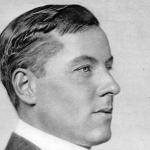There was a woman, and she was wise; woefully wise was she;
She was old, so old, yet her years all told were but a score and three;
And she knew by heart, from finish to start, the Book of Iniquity.
Unloved I live, unloved I die, unpitied, unforgiven;
A loathèd jade, I ply my trade, unhallowed and unshriven.
I paint my cheeks, for they are white, and cheeks of chalk men hate;
Mine eyes with wine I make them shine, that man may seek and sate;
With overhead a lamp of red I sit me down and wait
Until they come, the nightly scum, with drunken eyes aflame;
Your sweethearts, sons, ye scornful ones — ’tis I who know their shame.
The gods, ye see, are brutes to meiand so I play my game.
For life is not the thing we thought, and not the thing we plan;
And Woman in a bitter world must do the best she can —
Must yield the stroke, and bear the yoke, and serve the will of man;
Must serve his need and ever feed the flame of his desire,
Though be she loved for love alone, or be she loved for hire;
For every man since life began is tainted with the mire.
And though you know he love you so and set you on love’s throne;
Yet let your eyes but mock his sighs, and let your heart be stone,
Lest you be left (as I was left) attainted and alone.
From love’s close kiss to hell’s abyss is one sheer flight, I trow,
And wedding ring and bridal bell are will-o’-wisps of woe,
And ’tis not wise to love too well, and this all women know.
Wherefore, the wolf-pack having gorged upon the lamb, their prey,
With siren smile and serpent guile I make the wolf-pack pay —
With velvet paws and flensing claws, a tigress roused to slay.
One who in youth sought truest truth and found a devil’s lies;
A symbol of the sin of man, a human sacrifice.
Yet shall I blame on man the shame? Could it be otherwise?
Was I not born to walk in scorn where others walk in pride?
The Maker marred, and, evil-starred, I drift upon His tide;
And He alone shall judge His own, so I His judgment bide.
Fate has written a tragedy; its name is “The Human Heart.”
The Theatre is the house of Life, Woman the mummer’s part;
The Devil enters the prompter’s box and the play is ready to start.






Comment form: